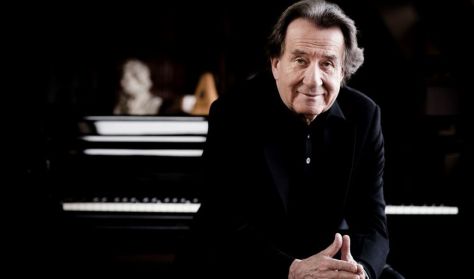
Orchestral concert: Dohnányi, Schumann, R. Strauss
Symphonic Minutes, then “something between a symphony, a concerto and a large sonata,” a symphonic poem, an opera excerpt and “an old scoundrel's tale – in rondo form.”
more

Symphonic Minutes, then “something between a symphony, a concerto and a large sonata,” a symphonic poem, an opera excerpt and “an old scoundrel's tale – in rondo form.”
more
Ön egy múltbeli eseményre keresett rá. Kérjük, válogasson aktuális kínálatunkból a Jegy.hu keresőjében!
Last event date: Saturday, March 11 2023 3:30PM
Three composers with a fantastic gift for orchestration; untold yet audible stories and the endless mix of timbres in an orchestra – this is on offer at the joint concert by the BFO and the legendary Rudolf Buchbinder, an authority with sixty years’ experience. The pianist, known for his Beethoven performances, appears on the podium after Dohnányi’s Symphonic Minutes (composed with a ballet stage in mind) to perform Schumann’s only completed piano concerto. After the intermission, the focus is on Richard Strauss: the story of the famous womanizer is followed by Oscar Wilde’s seductive but terrifying heroine, then, eventually, Till Eulenspiegel provides edifying minutes with his musical pranks.
In 1933, to celebrate the 80th anniversary of the Orchestra of the Philharmonic Society, the great trio joined forces: One work each from Bartók, Kodály, and Dohnányi was on the program of the jubilee concert. Years later, Symphonic Minutes reached the stage of the Hungarian Royal Opera House with choreography by Dohnányi’s wife, Elza Galafrés. The five movements are the ethereal Capriccio, a somewhat dejected Rapsodia, a buoyant Scherzo, a movement of variations on a 16th century melody and a carefree Rondo.
In 1841, Schumann wrote a lyrical fantasy for piano and orchestra, to which he added two further movements four years later. The Piano Concerto in A minor was thus born. The composer broke with tradition and, instead of presenting a showy solo instrument, he made the piano an integral part of the orchestra. The beautiful musical dialogs of the opening movement, the extreme emotions of the Intermezzo, and the virtuosity of the vigorous Finale, bursting in attacca, have made the piece one of the most popular concertos.
A teasing, increasingly vehement musical theme for four French horns with lyrical melodies between the returns of the theme – anyone can guess without knowing the title: this is all about Don Juan’s conquests. Strauss did not permit the printing of a text next to his composition of 1888 since the story could clearly be followed in his music. A concise, impressive portrait, rich in tunes.
A seductive woman to replace the seductive man: young Salome, performing a thrilling dance in front of her stepfather, can ask for anything in return for dropping her seven veils. And she wants the head of John the Baptist on a silver platter. The wonderful last scene, preceding complete madness, is the best-known part of Strauss’ opera, premiered in 1905; its exotic music builds up gradually.
The last piece of the concert commemorates Till Eulenspiegel, a scoundrel from the world of German tales. The distinct adventures, presented in rondo form, are connected by two unmistakable Till motifs, playing even after the death of the protagonist, since “épater le bourgeois” is everlasting.
Ernő Dohnányi: Symphonic Minutes, Op. 36
Robert Schumann: Piano Concerto in A minor, Op. 54
Richard Strauss: Don Juan, Op. 20;
Tanz der Sieben Schleier from Salome, Op. 54;
Till Eulenspiegels lustige Streiche, Op. 28
Rudolf Buchbinder (piano)
conductor: Iván Fischer
This multi-art production draws on the song, dance and literary traditions of Mezőség (Câmpia Transilvaniei), a region in Transylvania with a very exciting and colourful culture. Musically, the show is centred around movements from Mikrokosmos, Béla Bartók’s piano cycle, as well as the melodies from Mezőség that inspired him.
A 60-minute tour starts every day at 13:30, 15:00 and 16:30 in English. To request a tour in other languages (Italian, Spanish, German, French and Hungarian), please get in touch with the OperaTour team. Please note that the auditorium is closed for visits during rehearsals. Guided tours are not available during performances.
A világon először a Madách Színház kapta meg a jogot, hogy non-replica változatban állítsa színpadra a Mamma Mia! musicalt. A…
„Túl sötét.” „Micsoda posvány!” „Csupa ronda emberről ír!” „Ez a darab előadhatatlan, már a dialógusai miatt is.” „Disznók vagytok ti…
„Nem fiatalok. Nem szépek. Nem hibátlanok. De ma este színpadra lépnek, és le sem engedjük őket, míg nem marad –…
item(s) in basket
total:
Time limit has expired. Please, put item(s) in to basket again.